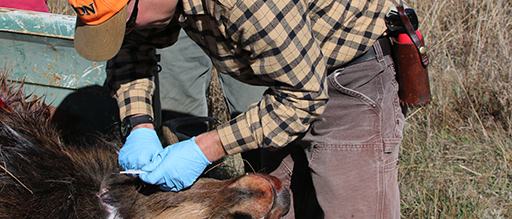Partners with Teton County on Chronic Wasting Disease
In a proactive step to combat the spread of chronic wasting disease, the Wyoming Game and Fish Department has offered to cover the disposal costs of big game carcasses for local hunters in Teton County. This initiative, in partnership with the Teton County trash transfer station, aims to encourage responsible disposal of game remains.
Hunters looking to dispose of their big game carcasses simply need to present their hunting license or carcass coupon to the transfer station attendant, ensuring no out-of-pocket costs for responsible disposal.

State Regulations on Game Carcasses
State regulations have been put in place to prevent environmental spread of the chronic wasting disease. These regulations emphasize the importance of leaving behind the remaining carcass at the site of harvest once all edible parts are extracted. For hunters who transport their game out of the field for processing, disposal in an approved landfill or incinerator is mandatory. It is worth noting that disposal of carcasses along highways or public lands is deemed illegal. Such irresponsible actions not only tarnish the reputation of hunters in the eyes of the public but also pose a risk by potentially attracting bears and other wildlife, which can lead to unforeseen dangers.
For further details about chronic wasting disease and a comprehensive list of approved landfills for big game carcasses disposal, hunters and the general public are urged to visit the Wyoming Game and Fish website.
Chronic Wasting Disease – What You Need to Know
- Definition and Affected Species
- CWD is a fatal central nervous system disease affecting mule deer, white-tailed deer, elk, and moose.
- It falls under transmissible spongiform encephalopathies (TSEs) caused by abnormally folded proteins called “prions.”
- Appearance and Symptoms
- Early in the disease, animals often show no signs.
- Later stages present with weight loss, reluctance to move, excessive salivation, droopy ears, increased drinking and urinating, lethargy, and eventual death.
- Many CWD positive animals appear healthy but test positive long before clinical signs emerge.
- Transmission Methods
- CWD can be spread through saliva, urine, feces, and infected carcasses.
- Contaminated feed or pasture poses risks since CWD prions persist for many years.
- The most common exposure is through ingestion.
- Distribution in Wyoming
- CWD was first detected in free-ranging mule deer in southeastern Wyoming in 1985.
- Initial outbreaks were in specific areas: Laramie Mountain mule deer herd, South Converse mule deer herd, Goshen Rim mule deer herd, and Laramie Peak elk herd.
- CWD has expanded over the past 20 years and is now found across most of Wyoming.
- Population Impact
- Research has shown declines in deer populations in specific areas due to CWD.
- Other areas with low prevalence show uncertain impacts but are considered alongside other negative factors affecting deer populations.
- Wyoming elk show less CWD prevalence than deer, with no documented direct population impacts.
- CWD has been detected in moose, but with minimal impact on their populations.
- Consumption Safety and Precautions
- No proven cases of CWD in humans, but potential risks exist based on non-human primate studies.
- It’s recommended not to consume CWD positive animals as per the CDC and the World Health Organization.
- For safe handling precautions when processing your harvested animal, refer to the provided Handling Precautions link.
- How You Can Help
- Test your harvested animal for CWD to aid statewide surveillance. Further details can be found at the Sample and Testing Info link.
- Report any sick deer, elk, or moose to the Wyoming Game and Fish Department.
- Follow carcass transport regulations, especially from areas known to have CWD. More details available at the Proper Carcass Disposal and Transport link.
- Changes Come to Jackson Hole’s Elk Refuge Hunt - October 8, 2023
- Victor Stabbing Leads to Attempted Murder Charge - October 3, 2023
- Grizzly Shot in Self Defense Near Yellowstone - September 29, 2023